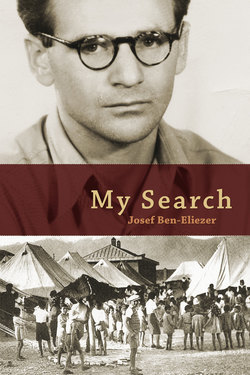Читать книгу My Search - Josef Ben-Eliezer - Страница 9
На сайте Литреса книга снята с продажи.
Оглавление5.
Exiled to Siberia
NOT LONG AFTER we registered to return to Poland, a curfew was called in Lvov. We had to wait in our house. Eventually, some soldiers came by with an officer from the secret police. They ordered us to come with them in ten minutes. It was a hot summer day, and we loaded everything we still had onto a truck waiting outside. Then we sat with forty or so other people on top of the baggage and were taken to the train station.
There were soldiers everywhere. We were sorted, somehow, into waiting freight trains – about forty cars with fifty or sixty people in each car. The boxcar had an elevated platform with a primitive hole for use as a toilet; it may have been screened off by a kind of partition. Ours was not the only train; I saw others, and I have heard that nearly 300,000 people were transported that day.
When everyone was loaded, the boxcars were locked shut and the train moved away. It was hot and stuffy, with only a small opening to peer through. We were all terribly thirsty, and there was nothing to drink. We were locked in those freight trains for two or three days, but it didn’t take long to realize that we were not heading towards Poland, but deeper into Russia.
After some days, the guards accompanying us opened the cars from time to time and let us out to find food and water. I don’t think Milech and Rahel were with us in the same boxcar, but they must have been in the same train, because we all ended up in the same place. Eventually, after about two weeks in the boxcars, we arrived in a Siberian town called Sosva. There we were ordered off the train and herded on foot along a river. Several kilometers farther, we finally arrived at our destination: an isolated settlement consisting of about one hundred log houses arranged in two double rows. This was to be our new home: Camp Forty-Five.
On our arrival, the commandant of the camp addressed us from a platform. He spoke Russian, and somebody translated. He said, “You’re probably thinking that you won’t stay here long. But I have been here for twenty-five years, and I can assure you that I have never seen anyone leave this place. So you had better get used to it. If you do, you will survive; otherwise you will perish.” That was our reception. We were now in “forced exile,” a status only slightly higher than that of the prisoners in Siberia’s infamous labor camps.
At that time, we were still disappointed that we had been tricked and sent to Siberia instead of to Poland, as we had been promised. But as we later found out, this probably saved our lives. Jews who chose to remain in the Soviet Union were relocated in the western Ukraine, and most of them were later murdered when the Germans invaded. Meanwhile, those of us who had applied for return passage to Poland were by then far from the Nazis, in the relative safety of Siberia. It was one of those times when God somehow used our own foolishness to protect us.
The log houses of the camp had been built by former exiles. Each one had two rooms, and every family was to get one room. My father immediately set about making the best of the situation. He first tried to occupy one of the best houses in the center of the camp, but we were soon evicted and told that it was reserved for privileged residents. So we ended up in the very last house of a row.
Our one room was about five meters square with an old-fashioned Russian woodstove in one corner. My father built a platform for us to sleep on and bartered with other refugees for bricks to improve the stove for heating and cooking. By the time he added a table and a primitive bench, the arrangement was reasonably comfortable.
Our next concern was to gather food and fuel for the winter. Mother took us two younger ones into the forest to pick cranberries. They were plentiful, and we harvested hundreds of liters. Father made a box in a shed outside to dry and store the berries for winter. We also worked very hard to build up a supply of firewood to keep ourselves warm through the long, harsh Siberian winter. Because of Father’s foresight and resourcefulness, we managed better than many families. Others later starved or froze when the harsh Siberian winter set in.
Dense forest surrounded the settlement, and the men’s main work was cutting firewood. They cut, split, and stacked the wood. Officials would come around, measuring the stacks and calculating wages. Corruption was rampant. Sometimes an official would say, “Give me a bottle of vodka, and I’ll let you just move this same pile to another spot. I’ll write down that you did double.”
